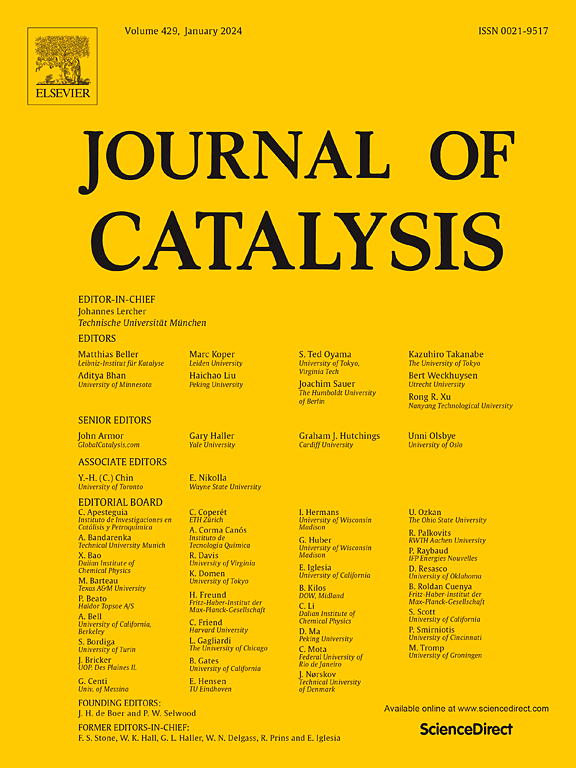调节一维共价有机框架中促进光催化制氢的电荷转移动力学
IF 6.5
1区 化学
Q2 CHEMISTRY, PHYSICAL
引用次数: 0
摘要
实现强偶极矩是改善氮杂环共价有机骨架(COFs)电荷分离的一种很有前途的策略。然而,其本征极化特性导致π电子弱离域,不利于光催化太阳能燃料的生产。本文将N原子分布不均匀的N杂环功能化非线性C2链与平面C4结凝聚成一维COFs,该COFs具有强偶极矩,具有有效的激子解离和高载流子分离特性。同时形成全π共轭段,作为快速载流子转移通道。结果表明,合成的1D COFs具有良好的光催化制氢性能,在420 nm处的量子效率(AQE)为0.17 %。这项工作提供了一种在分子水平上精确调节COF结构以实现高光催化性能的通用方案。本文章由计算机程序翻译,如有差异,请以英文原文为准。

Modulating charge transfer dynamics in one-dimensional covalent organic frameworks for boosted photocatalytic H2 generation
Achieving strong dipole moment has been established as a promising strategy to improve the charge separation of nitrogen (N)-heterocycle-based covalent organic frameworks (COFs). However, the intrinsic polarization property causes weak π-electron delocalization and detrimentally affects the photocatalytic solar fuel generation. Herein, N-heterocycle-functionalized nonlinear C2 linkage with nonuniform N atom distribution was condensed with planar C4 knots to construct one-dimensional (1D) COFs, which possesses strong dipole moment, thus contributing efficient exciton dissociation and high charge carrier separation feature. Furthermore, a fully π-conjugated segment was simultaneously formed, serving as fast charge carrier transfer channel. As a result, the synthesized 1D COFs achieves a remarkable photocatalytic H2 generation performance, and the aquantum efficiency (AQE) was detected to be 0.17 % at 420 nm. This work provides a general protocol for precisely modulating COF structure at molecular level to achieve high photocatalytic performance.
求助全文
通过发布文献求助,成功后即可免费获取论文全文。
去求助
来源期刊

Journal of Catalysis
工程技术-工程:化工
CiteScore
12.30
自引率
5.50%
发文量
447
审稿时长
31 days
期刊介绍:
The Journal of Catalysis publishes scholarly articles on both heterogeneous and homogeneous catalysis, covering a wide range of chemical transformations. These include various types of catalysis, such as those mediated by photons, plasmons, and electrons. The focus of the studies is to understand the relationship between catalytic function and the underlying chemical properties of surfaces and metal complexes.
The articles in the journal offer innovative concepts and explore the synthesis and kinetics of inorganic solids and homogeneous complexes. Furthermore, they discuss spectroscopic techniques for characterizing catalysts, investigate the interaction of probes and reacting species with catalysts, and employ theoretical methods.
The research presented in the journal should have direct relevance to the field of catalytic processes, addressing either fundamental aspects or applications of catalysis.
 求助内容:
求助内容: 应助结果提醒方式:
应助结果提醒方式:


